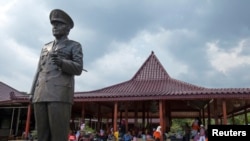Activists in The Hague are preparing to stage what they say is an unofficial tribunal looking into the 1965 mass murder of communists in Indonesia.
Nursyahbani Katjasungkana, the general coordinator of the International People’s Tribunal, told VOA the trial, starting Tuesday, will involve seven international judges and attorneys and 16 witnesses.
“We are opening the world’s eyes about this case," she said.
She added there are nine charges to be reviewed by the tribunal, including mass killings, forced disappearances, torture, sexual violence and involvement of other countries in the tragedy.
Bejo Untung, a victim of the 1965 tragedy, praised the tribunal and said it is time for people like him to regain full rights as citizens.
“We have been treated as second class citizens. We couldn’t work as teachers, puppeteers. We couldn’t apply to become a soldier in the army, etc," he said. "And whenever we do some kind of activities we suffer discrimination. This has to stop."
Nursyahbani said she wants the government to apologize to families of victims of the tragedy, which would serve as an acknowledgement that such crimes have occurred.
But Arrmanatha Nasir, a spokesman for the foreign ministry, said the government considers the tragedy a closed matter.
“We do not take any particular position in that matter," he said. "[The tragedy] was an action taken by community groups. For the government, the 1965 issue is closed.”
Last month, Indonesian President Joko Widodo said there is no plan for the government to apologize to victims of the massacre.
On September 30-October 1, 1965, six senior Indonesian generals were killed in the failed coup attempt, which was later blamed on the nation's communist party, the PKI. Over the next several months, an estimated 500,000 or more were killed in a purge.
The failed coup and subsequent purge led to the rise of former President Suharto, who led an autocratic government for more than 30 years.
This report was produced in collaboration with the VOA Indonesian service.








